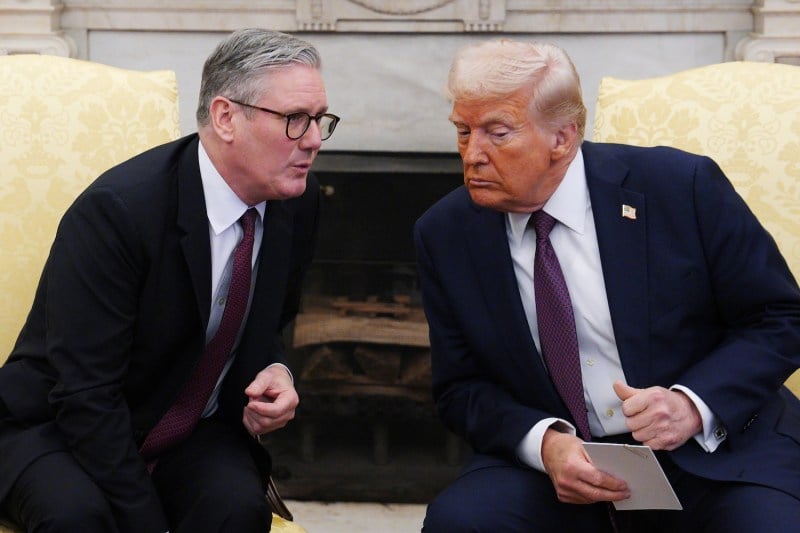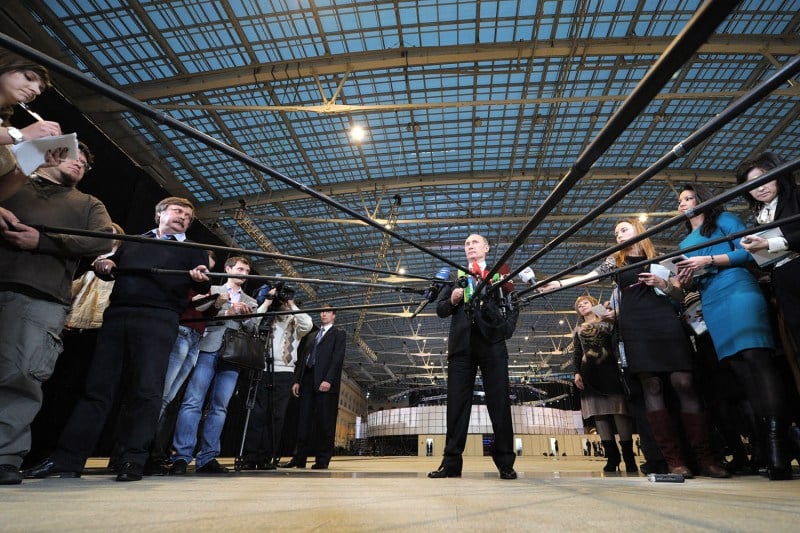Britain’s Abusive New Relationship With America

Britain’s Abusive New Relationship With America
Keir Starmer is getting used to his very uncomfortable role in Donald Trump’s world.
Keir Starmer meets with U.S. President Donald Trump, during a bilateral meeting in the Oval Office at the White House on February 27, 2025 in Washington. Carl Court – Pool/Getty Images
There’s nothing that upsets the British more than being ignored by the Americans. Or, if I’m being cruel, there’s nothing that upsets them more than not being shown love by the Americans. The special relationship between the two countries is an article of faith. It is desperately sought by one side and conferred with a pat on the head by the other.
For sure, there have been bumps in the road. U.S. President Lyndon B. Johnson was infuriated when British Prime Minister Harold Wilson declined to help him with Vietnam in 1967; Prime Minister John Major got on President Bill Clinton’s bad side when the Conservatives in the United Kingdom campaigned for George H.W. Bush in 1992. In 2016, President Barack Obama infuriated the Brexiteers by warning voters that it would put the U.K. at the “back of the queue” for any trade deal if it left European Union. His prediction came true, at least for a while.
There’s nothing that upsets the British more than being ignored by the Americans. Or, if I’m being cruel, there’s nothing that upsets them more than not being shown love by the Americans. The special relationship between the two countries is an article of faith. It is desperately sought by one side and conferred with a pat on the head by the other.
For sure, there have been bumps in the road. U.S. President Lyndon B. Johnson was infuriated when British Prime Minister Harold Wilson declined to help him with Vietnam in 1967; Prime Minister John Major got on President Bill Clinton’s bad side when the Conservatives in the United Kingdom campaigned for George H.W. Bush in 1992. In 2016, President Barack Obama infuriated the Brexiteers by warning voters that it would put the U.K. at the “back of the queue” for any trade deal if it left European Union. His prediction came true, at least for a while.
The most illustrative moment in recent history, however, belongs to Prime Minister Tony Blair and President George W. Bush. After the 9/11 terrorist attacks in the United States, the Blair became the galvanizer-in-chief for the White House. He was spectacularly successful in assembling a coalition of the willing for the invasion of Afghanistan. Within months, however, Bush had turned his attention elsewhere, announcing in a State of the Union address that he would go after the “axis of evil,” at the heart of which was Saddam Hussein and Iraq.
Blair had no idea this was going to happen, and he resolved he would never be blindsided by the White House again. As I wrote in my book, Blair’s Wars, he spoke with Bush in April 2002 and said he would go along with him, come what may. The rest, as they say, is dodgy dossiers, spurious legal advice, elusive weapons of mass destruction, and a disastrous occupation. All the various public enquiries that followed have corroborated this chain of events.
This line of thinking—always being at the United States’ right hand—is deeply embedded in British political psychology. It was that way before the U.K. joined the EU, while it was a member, and since it walked away. It is based in a small amount of hubris and a large lack of confidence. It was born in the hope that the relationship restores the status the U.K. once held on its own and still clings to.
President Donald Trump has upended pretty much every aspect of the world order. One of the byproducts of this is how London behaves in regards to Washington. During Trump’s first administration, it wasn’t that difficult to navigate. Prime Minister Theresa May found him distasteful but was able to work with him. Prime Minister Boris Johnson became a soulmate of his mercurial double across the pond—even though Johnson had made some unsavory remarks about Trump during his tenure as London’s mayor. In any case, Trump’s bark was worse than his bite.
This time around, however, everything is different—far more threatening than even the most assiduous strategists would have predicted.
The recent fraught weeks, during which Trump has humiliated Ukraine and embraced Russia, in which Ukrainian President Volodymyr Zelensky has been called a “dictator” and Russian President Vladimir Putin has been praised as a man of peace, have tested the mettle of all European leaders.
Trump and his people initially didn’t like what they saw in Prime Minister Keir Starmer, not least because Labour officials had gone to the United States to campaign for Vice President Kamala Harris.
MAGA ideologues regard Britain as infected with “woke,” not dissimilar to elsewhere in Europe. Yet they venerate other British cultural symbols like the monarchy, seeing them as a route back to a traditionalism that they wish to thrust upon their own people. Believing the two countries to be joined together by a shared language and other social mores, the Trumpians assume, or rather require, the Brits will ultimately follow along—come what may.
A lawyer by training and instinct, Starmer took the view that the less he said publicly about Trump, the more he might be able to influence him behind the scenes. His first visit into the lion’s den was marked by ostentatious flattery. He brought a letter from King Charles III inviting the president to London for a second state visit, and he talked glowingly about the special relationship. Tickled pink, Trump provided some surprisingly warm words of his own.
On his return to the U.K., Starmer was delighted with his diplomatic handiwork, as was much of a domestic media that had taken to criticizing him at every turn. The media seemed to agree with Starmer’s assessment that the relationship was going well. But not all took that view, however. Writing in the Times, veteran commentator Matthew Parris called it a “cheap stunt.” He wrote, “Going well? Yes, if to watch a British prime minister dancing attendance upon a monster and tickling its fancy is to watch an encounter ‘going well.’”
Starmer was not alone. Three days earlier, French President Emmanuel Macron made a pilgrimage to the White House and even managed to put his hand on Trump’s knee.
Then, barely hours after Starmer had returned to the U.K., came the ambush of Zelensky in the very same room.
To their credit, Starmer and Macron have tried to deal with each setback with as much steely resolve as possible. All Europe’s main players are operating with impediments. Macron is a presidential lame duck. Germany is waiting for its new government, though with the announcement of a $500 billion defense fund, Friedrich Merz has wasted no time in signaling his determination to step up.
Britain’s role is the most intriguing. Many in the European Commission and among EU member states have feared that Trump would exploit the U.K.’s position outside the bloc to drive a further wedge. Trump has already hinted he’ll do so, suggesting to Starmer that he might exempt the Brits from all or some of the tariffs that he’s waiting to slap on Europe. That would, as the British and American right-wing say, help “get Brexit done.”
It is a byproduct of the wider aim, shared by the Trumpians and by Putin, of undermining the EU from inside and out. In the early post-Brexit years, the EU was keen to distance itself from the U.K. and not reward it for its decision to leave. But now, for the EU, it seems everything is up for discussion with the Brits—including some flexibility in London’s arrangements with Brussels— as part of a more immediate task of helping Europe defend itself from the Trump-Putin axis. Trump’s hope seems to be that Starmer will break ranks, recommitting Britain to become an offshore haven for American (and presumably Russian) economic interests.
Which way will Starmer turn? Will he play the part of a teacher’s pet? Or will he stand firmly in unison with his European partners? Starmer has insisted that it’s a false choice and, so far, he appears to have been true to his word.
With Britain outside the formal structures of the EU, Starmer has to rely upon what used to be called variable geometry. He is also using a phrase beloved by former President George W. Bush: coalition of the willing. So far, the European approach is being coordinated by the British and French, with the Germans presumably about to join the top table, along with the EU and NATO. These new permutations are likely to outlast this present crisis—no matter how long it lasts—suggesting a finessing of some of the Brexit boundaries.
Yet, with Trump being Trump, there are many more serious crises ahead. How far will the Trump administration go to appease Putin? How far will Putin penetrate, militarily and politically, into Ukraine—and, who knows, other countries—with the United States’ acquiescence or blessing? Will Trump achieve his wish to take over Greenland? What about the tariffs? These are the known unknowns.
How far will the British really go in standing up to the White House? At what point will they be forced to realize that not only is the relationship no longer special (it hasn’t been for a long time), but that the friend is an adversary? Starmer is hoping that, by hanging in there, he can curb the instincts of his—and Europe’s—abusive partner.
John Kampfner is the author of Why the Germans Do It Better: Notes from a Grown-Up Country.
More from Foreign Policy
-

Samuel Huntington holds his hand to his chin while sitting in an office. Samuel Huntington Is Getting His Revenge
The idea of a global “clash of civilizations” wasn’t wrong—it was just premature.
-

U.S. President Donald Trump meets with Ukrainian President Volodymyr Zelensky at the White House on Feb. 28. The Perils of a Reality TV Presidency
The Trump-Zelensky shouting match is a reminder that international diplomacy was never meant to be carried out in front of billions of eyes.
-

A Ukrainian serviceman trains in the woods near the frontline in Ukraine. Three Years On, What’s Next for Europe and Ukraine?
Nine thinkers on the bombshells coming out of Washington.
-

Donald Trump is seen inside a helicopter at night looking down at a cell phone Trump’s New Map
America’s first post-literate president has only geography to fall back on.







Join the Conversation
Commenting on this and other recent articles is just one benefit of a Foreign Policy subscription.
Already a subscriber?
.
Subscribe
Subscribe
View Comments
Join the Conversation
Join the conversation on this and other recent Foreign Policy articles when you subscribe now.
Subscribe
Subscribe
Not your account?
View Comments
Join the Conversation
Please follow our comment guidelines, stay on topic, and be civil, courteous, and respectful of others’ beliefs.
Change your username |
Log out
Change your username:
CANCEL
Confirm your username to get started.
The default username below has been generated using the first name and last initial on your FP subscriber account. Usernames may be updated at any time and must not contain inappropriate or offensive language.